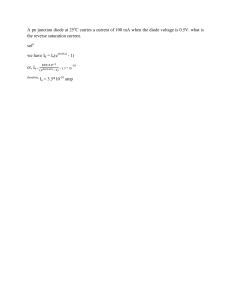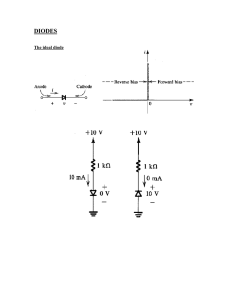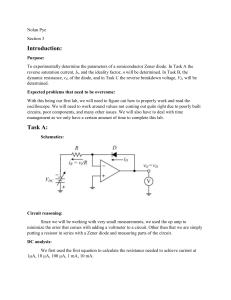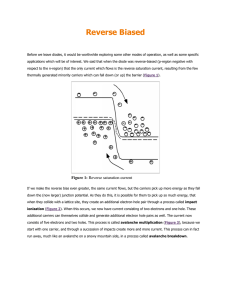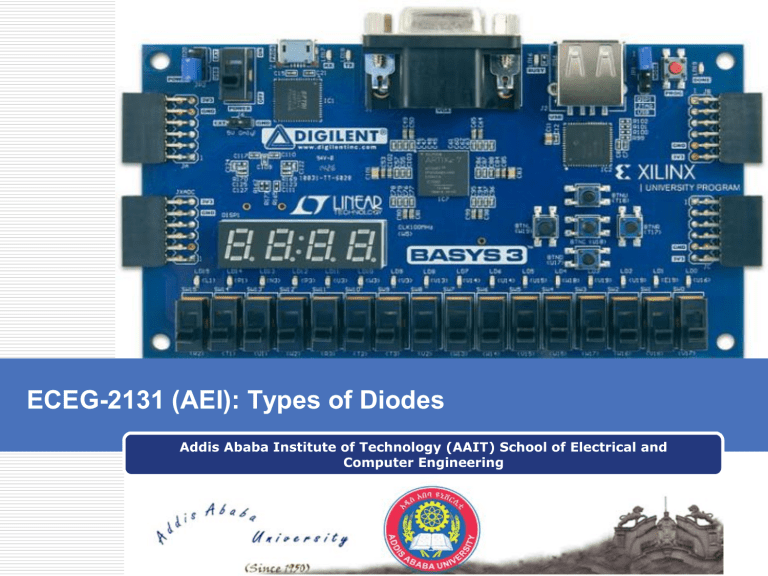
ECEG-2131 (AEI): Types of Diodes Addis Ababa Institute of Technology (AAIT) School of Electrical and Computer Engineering Learning Outcomes At the end of the lecture, students should be able to know about: Zener Diodes. Tunnel Diodes. Varactor Diodes. Schottky Diodes. Shockley Diodes. Light-Emitting Diodes AAIT, School of Electrical and Computer Engineering 2 Zener Diodes Are specifically designed to operate under reverse breakdown conditions. These diodes have a very accurate and specific reverse breakdown voltage. The maximum reverse-bias potential that can be applied before entering the breakdown region is called the peak inverse voltage (PIV) AAIT, School of Electrical and Computer Engineering 3 Reverse Breakdown As the reverse voltage across the pn junction increases, eventually “breakdown” occurs and a sudden, enormous current is observed. The breakdown resulting from a high voltage (and hence a high electric field) can occur in any material. E.g. Lightning A high electric field in the depletion region may impart enough energy to the remaining covalent electrons to tear them from their bonds. AAIT, School of Electrical and Computer Engineering 4 Reverse Breakdown: Zener Effect In order to create such high fields with reasonable voltages, a narrow depletion region is required, which implies high doping levels. This type of breakdown is called the Zener Effect. It appears for reverse bias voltages on the order of 3-8 V It has a negative temperature coefficient for the breakdown voltage. (i.e. as the temperature increases the breakdown voltage decreases) AAIT, School of Electrical and Computer Engineering 5 Reverse Breakdown: Avalanche Effect It takes place when a reverse bias voltage increases across a junction with moderate or low doping levels (<1015cm-3). Because of small leakage current, each carrier entering the depletion region experiences a very high electric field and hence a large acceleration, gaining enough energy to break the electrons from their covalent bonds. This phenomenon called “impact ionization,” can lead to avalanche. AAIT, School of Electrical and Computer Engineering 6 Reverse Breakdown Avalanche Effect has a positive temperature coefficient for the breakdown voltage. (i.e. as the temperature increases the breakdown voltage increases as well). The Zener and avalanche breakdown effects do not damage the diodes if the resulting current remains below a certain limit given by the doping levels and the geometry of the junction. Both the breakdown voltage and the maximum allowable reverse current are specified by diode manufacturers. AAIT, School of Electrical and Computer Engineering 7 Zener Diode A Zener is a diode operated in reverse bias at the Zener voltage (VZ). The voltage that causes a diode to enter the Zener region of operation is called the Zener voltage. Zener diodes are available having Zener potentials of 1.8 V to 200 V with power ratings from 1⁄4 W to 50 W. Zener Diodes are used in the design of voltage regulators. AAIT, School of Electrical and Computer Engineering 8 Tunnel Diode It is a high-conductivity two-terminal P-N junction diode having doping density about 1000 times higher as compared to an ordinary junction diode. This doping level produces three unusual effects: reduces the width of the depletion layer to an extremely small value (about 0.00001 mm). reduces the reverse breakdown voltage to a very small value (approaching zero). i.e. the diode appears to be broken down for any reverse voltage. produces a negative resistance section on the V/I characteristic of the diode. AAIT, School of Electrical and Computer Engineering 9 Tunnel Diode Due to its extremely thin depletion layer, electrons are able to tunnel through the potential barrier at relatively low forward bias voltage (less than 0.05 V), hence its name. AAIT, School of Electrical and Computer Engineering 10 Tunnel Diode Tunnel diodes can be used as high frequency oscillators as the transition between the high electrical conductivity is very rapid. They can be used to create oscillation as high as 5Gz. Normal diode transistors do not perform well in microwave operation. So, for microwave generators and amplifiers tunnel diode are preferred. AAIT, School of Electrical and Computer Engineering 11 Varactor Diode A Varactor diode is a P-N junction diode that changes its capacitance as the bias applied to the diode is varied. It is used in the reversed biased condition. Its junction capacitance decreases with an increase in the depletion region width caused due to an increase in the reverse bias voltage (VR). AAIT, School of Electrical and Computer Engineering 12 Varactor Diode Varactor diodes are used in the design of Voltage Controlled Oscillator. These diodes can be used as frequency modulators and RF phase shifters. These diodes can be used as frequency multipliers in microwave receiver. AAIT, School of Electrical and Computer Engineering 13 Schottky Diode It is also called Schottky barrier diode or hot-carrier diode. It is a metal-semiconductor junction diode with no depletion layer. It is a unipolar device because it has electrons as majority carriers on both sides of the junction. Since no holes are available in metal, there is no depletion layer to worry about. Hence, Schottky diode can switch OFF faster than an ordinary PN junction diode. It is very common in computers because of their ability to be switched on and off so quickly. AAIT, School of Electrical and Computer Engineering 14 Shockley Diode It is a two-terminal four-layer diode, unlike other diodes which are normally made with two layers. It is generally used to control the average power delivered to a load. AAIT, School of Electrical and Computer Engineering 15 Light Emitting Diode (LED) As the name indicates, it is a forward-biased P-N junction which emits visible light when energized. LEDs are designed with a very large bandgap so movement of carriers across their depletion region emits photons of light energy. Lower bandgap LEDs emit infrared radiation, while LEDs with higher bandgap energy emit visible light. Have many applications in everyday life. AAIT, School of Electrical and Computer Engineering 16 Other Diodes Photodiode (Solar Cells) PIN Diode Gunn Diode IMPATT Diode Step Recovery Diode … AAIT, School of Electrical and Computer Engineering 17 What to Do This Week? Reading Assignment Practical Diode Circuits Rectifiers, Clippers, Clampers, Zener Regulators. AAIT, School of Electrical and Computer Engineering 18
